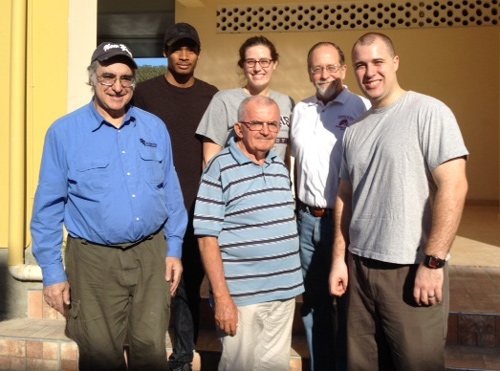 Word on Manhattan College’s innovative research in designing water filtration systems to produce clean water in developing areas, including the Philippines and Kenya, has spread to Haiti. As a result, Gennaro J. Maffia, Ph.D., professor of chemical engineering, and two of his students, Sarah Boisvert ’14 and Gregory Perrier ’15, embarked on a three-day trip in February to Haiti to help a fellow Lasallian School.
Word on Manhattan College’s innovative research in designing water filtration systems to produce clean water in developing areas, including the Philippines and Kenya, has spread to Haiti. As a result, Gennaro J. Maffia, Ph.D., professor of chemical engineering, and two of his students, Sarah Boisvert ’14 and Gregory Perrier ’15, embarked on a three-day trip in February to Haiti to help a fellow Lasallian School.
The school, which opened for first through fourth grades in 2012, has nearly tripled in size in one year and has since added a preschool and fifth grade. Construction also broke ground last summer on a health and nutrition educational center for women and children, and a community garden.
The College Saint Jean Baptiste De La Salle School is located in the Cazeau section of Port-au-Prince, and opened its doors in the aftermath of the 2010 earthquake. With the desperate need for education, the Brothers of the Christian Schools Institute saw the need for a new school in Haiti.
Manhattan College first became connected with the project in Haiti through its own affiliation with the Institute of the Brothers of the Christian Schools, District of Eastern North America (DENA). During the past few years, chemical engineering students have worked on water issues around the world, from fracking water in Pennsylvania to filtering rainwater in the Philippines. They have tested commercially available devices and developed their own chemical and biological additives to aid in water clarification.
One Lasallian Family
The Manhattan team traveled to Haiti with Alan Weyland, executive director for mission and ministry at DENA, and Sean Hutchinson, community service coordinator at La Salle University in Philadelphia.
“Our main goal was to gain information on the specifications of the water purification system being installed and provide help to the Brothers and children in need of potable water,” says Perrier, a senior majoring in chemical engineering.
During their time at the school, the team from Manhattan stayed with the Brothers and learned more about the various water and construction projects. Currently, the water being circulated to the school and the Brothers’ residence is not used for consumption, and the local community only has access to small quantities of water at very high prices. Therefore, a new water system is in the process of being built with the drilling of a deeper well and plans for purification via a high-end reverse osmosis system. This effort will provide clean drinking water on site and to the local community.
The water project is already in the hands of a contractor from Port-au-Prince, and the Manhattan students made recommendations for additional cost-effective solutions by using Sawyer Products, which could also provide potable water from the tap in the Brothers’ residence and women’s clinic. Sawyer has an office in Port-au-Prince, and many of its filtration units are used at missions in Haiti.
Helping Hands for Haiti
The team also interacted with children at the school and gained more insight into other needs, including school supplies, classroom infrastructure, technology in the classrooms, and plans for future vegetable gardens.
I think that this trip provided a valuable lesson — that what they learned they can actually apply right away and make a difference in the world.
“One [project is] to form a team with some fellow Jaspers in education and put together science education kits for the classrooms with age-appropriate lesson plans,” explains Boisvert, who recently graduated with a B.S. in chemical engineering.
“I think that this trip provided a valuable lesson for Greg and Sarah and for the other Jaspers on the Haiti project team, to gain the sense that what they learned they can actually apply right away and make a difference in the world,” Maffia says.
The team put together a list of projects that Manhattan students and faculty may be able to assist with on future trips. In addition to the analysis of the water system, a few recommendations were made to use solar systems to increase electricity supply and reliability and provide hot water.
“It is our desire to return to the school in the future and continue to help with the issue of the potable water deficiency,” Perrier adds. “This trip offered us a fulfilling experience that helped us realize how much help is needed in third-world countries such as Haiti.”